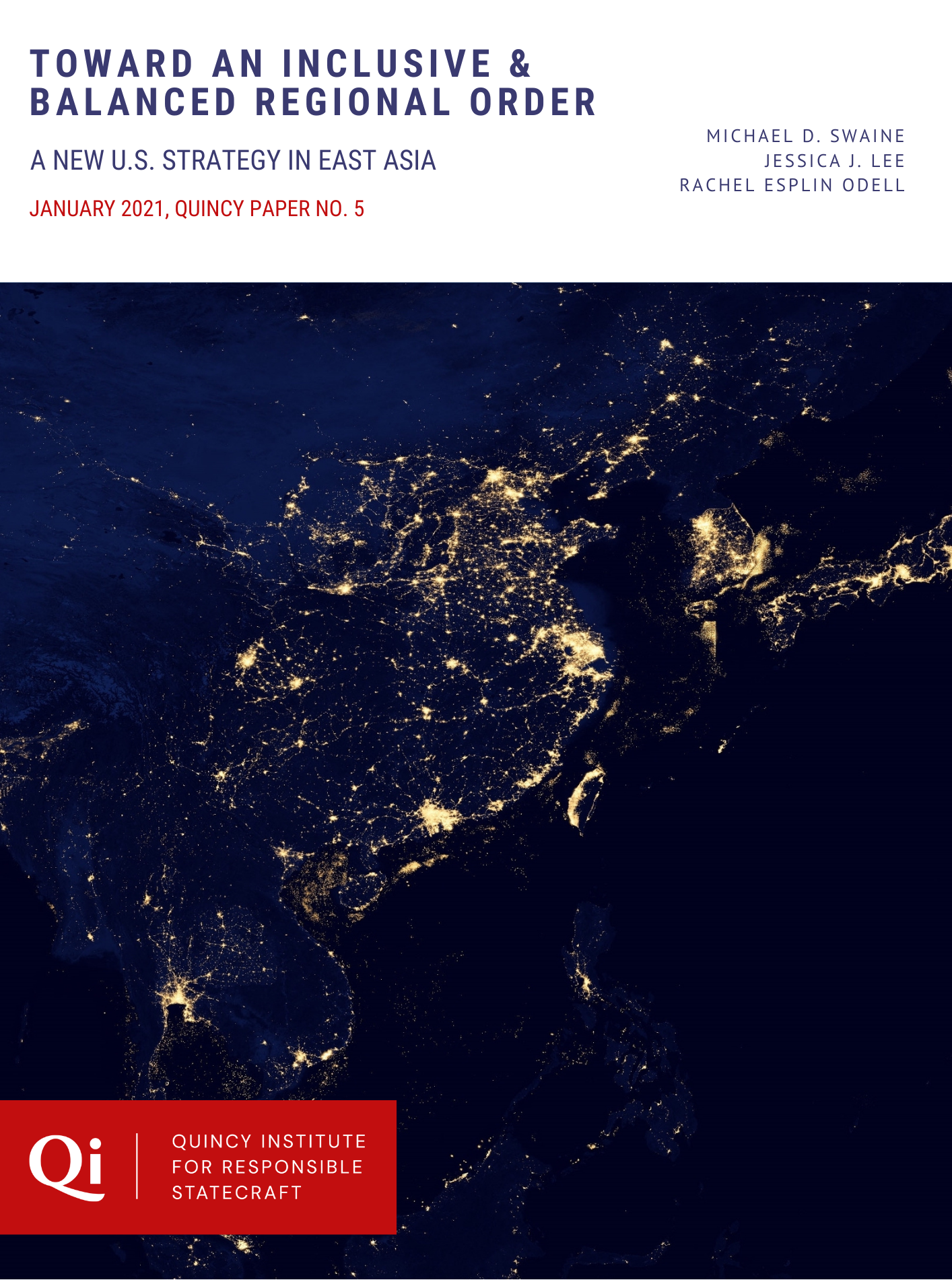Pompeo’s Taiwan Move Creates a Decision Point for Biden on China
FOR IMMEDIATE RELEASE
CONTACT: Jessica Rosenblum, Director of Communications, Quincy Institute for Responsible Statecraft, 202.800.4662/ [email protected]
WASHINGTON–Secretary Pompeo’s announcement this weekend lifting U.S. government restrictions on engaging with Taiwan is “the latest effort by the Trump administration to corner the Biden team into a dangerous set of confrontational policies in East Asia that are detrimental to the United States,” according to Michael Swaine, the co-author of a new report that lays out an alternative East Asia strategy for the incoming administration.
“Effectively eviscerating the ‘One China’ policy on which the normalization of U.S.-China relations is based is an ideological provocation by the Trump administration designed to lock in its legacy of a cold war-style confrontation with China. Pompeo aims to saddle Biden with these reckless, ill-conceived policies, or require him to spend significant political capital to undo them,” says Swaine, Director of Quincy Institute’s East Asia program. “If President-elect Biden wants to avoid an expensive arms race and, potentially, a hot war with China, he and his team must seize this moment to break from zero-sum thinking that the Trump regime has stoked in Washington and in the region.”
The report released today by the Quincy Institute for Responsible Statecraft offers the Biden administration a detailed plan to reverse this dangerous course. “Toward an Inclusive and Balanced Regional Order: A New U.S. Strategy in East Asia” puts forward an agenda that reflects the complexity and dynamism of a region whose stability requires strong relationships with both Washington and Beijing, which can no longer be dominated by either power, and which is moving toward ever higher levels of economic integration. The report calls for an American rebalance in the region, toward much deeper diplomatic and economic engagement, and much less military dominance and political control.
Current U.S. policy is predicated on an outmoded notion that the United States has the capacity to contain a rising China and to sustain its own eroding military domination of the region at an acceptable economic, ecological, and political cost. In fact, America’s decision in recent years to double down on its strategy of dominance and control is feeding perceptions of America’s relative decline, heightening tensions in regional disputes, and exacerbating transnational security threats.
Although Beijing and Washington are engaged in competition for relative influence in a variety of areas, only two of these areas — advanced technologies and military capabilities — have potentially significant strategic ramifications. In no other area — whether political values, global norms, economic markets, or multilateral institutions — is the rivalry sufficiently consequential, broad based, or zero-sum to affect the relative position of either country in the global distribution of power. In fact, in many of these areas incentives for both sides to pursue positive-sum outcomes clearly exist, potentially mitigating the scope and depth of the competition.
“While China does pose some significant challenges to U.S. interests, it does not constitute an existential threat to the global order or to the United States,” says co-author Rachel Esplin Odell, a research fellow at the Quincy Institute.
“The true existential threat is the prospect that a new cold war could plunge the world into an intense military rivalry and prevent critical cooperation on climate change, pandemics, financial crises, and nuclear arms control,” Odell adds. “How, for instance, can we take the necessary steps to combat climate chaos, if the world’s top two carbon emitters are locked in an arms race or armed conflict?”
To protect vital American interests in East Asia, the United States needs a transformed strategy. It must pursue a more stable military balance with China and peace on the Korean Peninsula, and bolster U.S. influence and appeal through reforms at home and abroad. And it must reprioritize deepening economic and diplomatic engagement as the most effective defense against the paramount threats to U.S. national security — namely climate change and pandemics. The report calls on the United States to:
Pursue a more stable military balance with China & peace on the Korean Peninsula
- Restructure U.S. alliances and force posture in East Asia around a defense strategy of denial rather than control.
- Improve U.S.–China crisis management and mitigate tension in the Taiwan Strait.
- Reduce military tensions at sea and encourage compromise in maritime disputes.
- Undertake new, stabilizing initiatives on nuclear policy and bilateral arms control.
- Pursue peace and phased denuclearization on the Korean Peninsula.
Reprioritize diplomatic engagement and economic integration
- Shift toward inclusive regional diplomacy and cooperative security.
- Deepen regional economic engagement and promote global technological standards.
- Reinvigorate cooperation with China on pandemics, climate change, and trade.
Bolster U.S. influence and appeal through reforms at home and abroad
- Implement a targeted approach to human rights promotion.
- Strengthen U.S. influence and appeal by enacting domestic reforms.
“The United States today is on a crash course with China in East Asia that threatens the peace and prosperity of a region vital to a wide range of American interests. The Trump administration has doubled down on dominance and an effort to paint the relationship as zero-sum,” says Swaine. “The Biden team must embrace a more realistic and stabilizing strategy in East Asia, built on military restraint, economic reengagement, diplomatic creativity, and domestic revival.”

